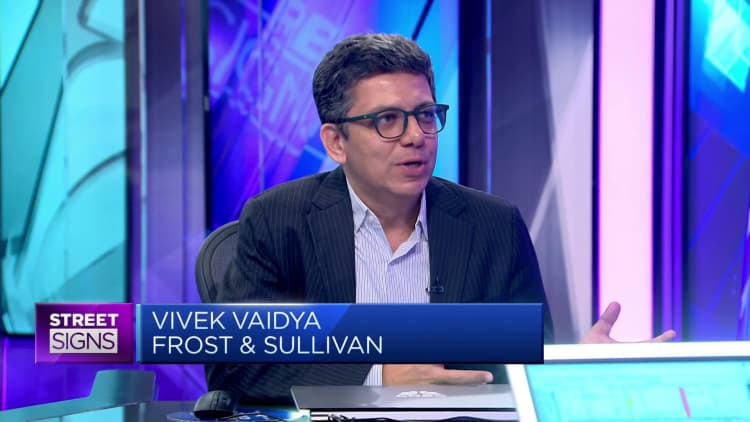Nio’s ET5 stands on display at the Central China International Auto Show on May 25, 2023, in Wuhan, China.
Getty Images | Getty Images News | Getty Images
Shares of Chinese electric vehicle maker Nio Inc jumped 20% Thursday after its vehicle deliveries more than doubled in April.
Hong Kong-listed shares of the company jumped as much as 23% to 44.20 Hong Kong dollars, touching their highest level in over six weeks. Nio shares also helped boost the broader Hang Seng index, which jumped 2% by midday trading.
Nio said it delivered 15,620 vehicles in April, a 134.6% year-on-year increase.
“The deliveries consisted of 8,817 premium smart electric SUVs, and 6,803 premium smart electric sedans,” the company said in a statement on Wednesday.
Nio has delivered 45,673 vehicles so far this year, 21.2% higher than the same period a year earlier.
The Chinese EV maker has also been expanding its battery swap partnerships as it seeks to get an edge on the infrastructure side of the EV ecosystem. Efforts like these are aimed at relieving consumers’ anxiety about driving range.
Other Chinese EV makers including Li Auto, Xpeng, and BYD also reported April deliveries on Wednesday, while Li Auto was the only company to have reported lower deliveries than the previous month.
Li Auto delivered 25,787 vehicles in April, down 11% from March. Hong Kong-listed shares of the company were still 3% higher.
Xpeng said it delivered 9,393 EVs in April, up 4% from the prior month. BYD’s sales volume for EVs was 313,245 in April, up 3.6% from March’s 302,459.
Hong Kong-listed shares of Xpeng jumped 7.5%, while those of BYD added 5%%.
Price wars heat up

Chinese smartphone maker Xiaomi recently joined the fray, and launched an electric car in early April. The company priced the SU7 at about $4,000 less than Tesla’s Model 3. The company also claimed the new car would have a longer driving range.
Just last week, CEO Lei Jun said its new EV is selling better than expected, and the company hopes to break even sooner than anticipated despite selling it cheaper than Tesla’s Model 3.
— CNBC’s Evelyn Cheng contributed to this story.















































































